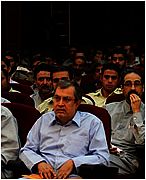Self-confessions Too Have No Validity
» Lawyers Respond to Leader’s Comments
During his nationally televised Eid Fetr speech on Friday, Iran’s leader ayatollah Khamenei remarked for the first time on the confessions of detained protestors. He said that self-confessions of the detainees were valid but confessions (i.e. accusations) against others were not valid.
These remarks have led to different responses. Rooz spoke with Abdol-Fattah Soltani, the prominent Iranian attorney and member of the Center for the Defense of Human Rights, and Nasser Ghavami, the former head of parliament’s legal committee (in late 1990s and early 2000s). Here are the excerpts of their views.
Self-Confessions Under Duress are Invalid
Soltani believes that confessions against one self are valid only if they are made under normal circumstances. “The conditions for self-incriminatory confessions have been laid out in the (Iranian) constitution and code of criminal procedure which clearly state that any self-confession that is made under duress, uncertainty or even deception is against the law and cannot be used as evidence.”
He goes on to say that “One of the conditions that indicate that confessions were obtained under unusual circumstances is when a suspect is taken directly from prison to the court and tried. If the confessions (in these cases) were made through normal course of events, why don’t the authorities release the prisoners on bail until the day of their trial?” He continues, “If a suspect repeats his self-incriminatory confessions in court after he had been freed from detention and on his return to court, in accordance with article 168 of the constitution and in the presence of a jury, then his confessions may be accepted.”
Soltani said that suspects were subjected to unlawful and illegal interrogation techniques while in prison, adding, “Unfortunately we are witness to the fact that suspects are not even allowed to choose a defense attorney for themselves, while being forced to accept the court-appointed defense. In post-election cases, courts have refused to accept the defense attorneys for many cases, which shows that the suspects are not kept under normal and regular conditions and that the confessions that are extracted have not been done so under legal conditions.”
Moses’ Miracles in Prison
Aghvami, another prominent human rights attorney, told Rooz that according to Islamic precedence, incriminating self-confessions against oneself by imprisoned suspects too are not acceptable. Aghvami explained that, “From the perspective of law and Islamic Figh (i.e. law), self-confessions of a person against himself are valid, but they have conditions that must be met. They must be completely free, voluntary and under circumstances in which there is absolutely no pressure, not even a suspicion of pressure and coercion.”
According to this former Majlis lawmaker self-confession of people in prison against themselves are not valid because prison conditions are not normal and a person is not free to make voluntary statements.
Aghvami mentioned the recent televised “self-confessions” of the detainees who are held because of the post-election protests and said, “How could someone with 30 or 40 years of political activism suddenly “realize” his mistakes while in prison for a few days?” Pointing to the unusual conditions under which these detainees are, Aghvami said, “These individuals have no idea what is going on outside the prison and have been denied access to attorneys, and so we do not know what they have been told or what kind of pressure or threats they have been subjected to which has made them suddenly realize what they had not seen for 30 years!”
Leader’s Comments; A Response to Rafsanjani Children’s Letter?
Ayatollah Khamenei’s remarks about political prisoners came after a letter written by Hashemi Rafsanjani’s children to the head of Iran’s judiciary was published in which they said that the act was a pressure tactic against Mr. Hashemi Rafsanjani, and also an attempt to “remove” him, asking the judiciary chief Sadegh Larijani to appoint an independent team to investigate the charges and rumors against them.
In their letter, the children of this veteran and influential politician, who heads the State Expediency Council that on paper supervises the work of the leader of the Islamic regime, write, “We have witnessed that in recent days by airing the remarks of some of the suspects of recent events, which by law can only be incriminating against themselves and not others, attempts are made to make unsubstantiated claims against one of the signatories of this letter.”
The reference that Rafsanjani’s children make is to the remarks of some of the protesters of the electoral coup during the sham trials - of which 5 have been held so far - where some individuals made accusatory remarks against Mehdi Hashemi, who is Hashemi Rafsanjani’s son.
Last Sunday, Rafsanjani made a public appearance by participating in Sunday’s Eid Fetr prayers, where he took a front row, along with other leaders of the Islamic regime.


